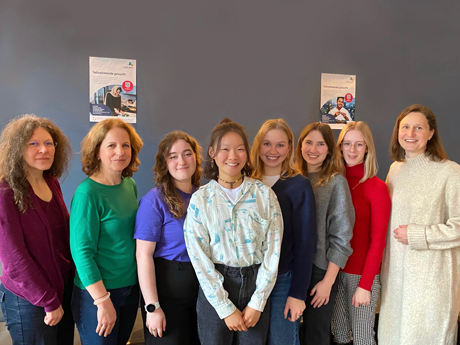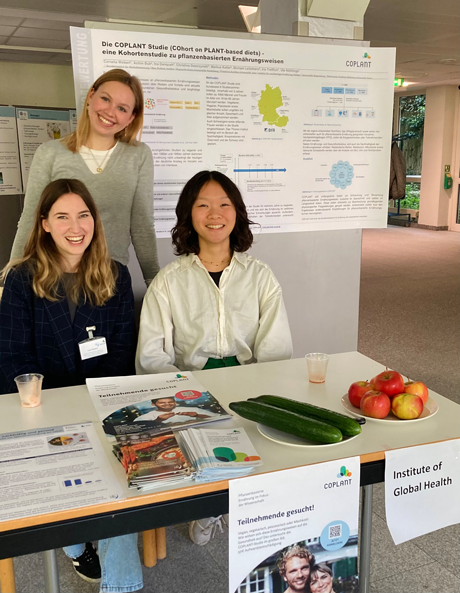You are here:
Ruprecht-Karls-University, Heidelberg
Study Centre at the Heidelberg Institute for Global Health (HIGH)
The COPLANT study centre in Heidelberg is run by the Heidelberg Institute for Global Health (HIGH). Prof Ina Danquah, who heads the "Climate Change, Nutrition and Health" research group at the HIGH, is in charge of the study. This research group is investigating the impact of climate change on human nutrition and nutritional status. The group also develops and tests ways of adapting to the existing effects of climate change on nutrition. The COPLANT study aims to identify strategies that harmonise climate protection and healthy nutrition. It is of particular interest to formulate strategies for people of different cultural backgrounds in the Rhine-Neckar district. The first participants will be welcomed to the study centre from summer 2023. Anyone interested in taking part in the study can register using the email address below.
The COPLANT study team welcomes you to the examination centre on the campus of the University Hospital in the Theoretikum.


Studies at the study centre at the Heidelberg Institute for Global Health
The COPLANT study is taking place at seven other locations in Germany and Austria. The study uses standardised procedures to ensure that the results are comparable. In two appointments, the study participants are asked to complete a comprehensive questionnaire, undergo physical examinations and provide biosamples. A smartphone-based app is used to record nutrition extensively. In detail, the study procedure includes
5 questionnaire modules:
- Socio-demographics (e.g. age, gender, education)
- Nutrition (e.g. reasons for diets)
- Lifestyle (e.g. smoking, alcohol, sport)
- Health (e.g. existing illnesses, well-being)
- Sustainability (e.g. place of purchase, food costs)
Physical examinations:
- Body composition
- Bone health
- Physical activity
Delivery of biosamples:
- Fasting blood samples
- Urine samples collected over 24 hours
- Stool samples
Interested study participants can also take part in an in-depth interview that deals with questions about the sustainability of their diet.
Directions/Site plan
The COPLANT Study Centre at the Heidelberg Institute for Global Health is located at Im Neuenheimer Feld 324, 3rd floor. You will find the entrance to the building directly next to the cafeteria, opposite the Botanical Garden.
By car to Heidelberg:
From the A 5 motorway at the Heidelberg junction or from the A 6 motorway at the Mannheim junction, take the A 656 towards Heidelberg.
Train connections Heidelberg main station:
Heidelberg is connected to the Deutsche Bahn intercity network. Information on connections can be obtained from the Deutsche Bahn.
Travelling to Neuenheimer Feld
By car:
- Coming from the motorway: At the end of the motorway, turn left towards Surgery, cross the Neckar on the Ernst-Walz Bridge, then turn left to the individual institutes.
- Coming from Neckargemünd: Follow Uferstraße on the right bank, turn into Posseltstraße, then straight ahead into Jahnstraße or turn right into Berliner Straße and then left to the individual institutes.
We recommend parking outside the campus grounds or travelling by public transport. The car parks are subject to a charge.
By public transport from the main railway station to Neuenheimer Feld:
RNV provides an overview of Heidelberg's local transport routes. From the main railway station to Neuenheimer Feld: Take bus line 31/32 or tram lines 21 and 24. Bus line 31/32 also runs from Uniplatz to Neuenheimer Feld. Stops for INF324 are Campus Im Neuenheimer Feld or Botanischer Garten.
Information on participation in the study
Who can take part?
People who are between 18 and 69 years old at the time of recruitment and have been pursuing one of the following diets for at least one year:
- vegan: no animal products
- vegetarian: no meat and fish, but dairy produce and eggs
- pescetarian: no meat, but fish
- omnivorous: both plant and animal products (mixed diet)
Further information can be found in our FAQ on the COPLANT study.
Contact us
COPLANT Study Centre
at the Heidelberg Institute for Global Health (HIGH)
Prof. Ina Danquah
Im Neuenheimer Feld 324
69120 Heidelberg
Phone: +49 6221 56 4670
E-mail: info-coplant@uni-heidelberg.de
